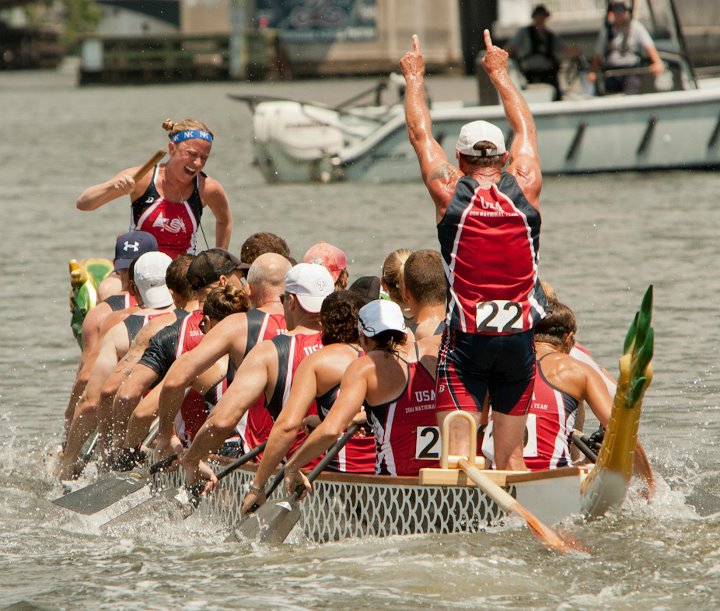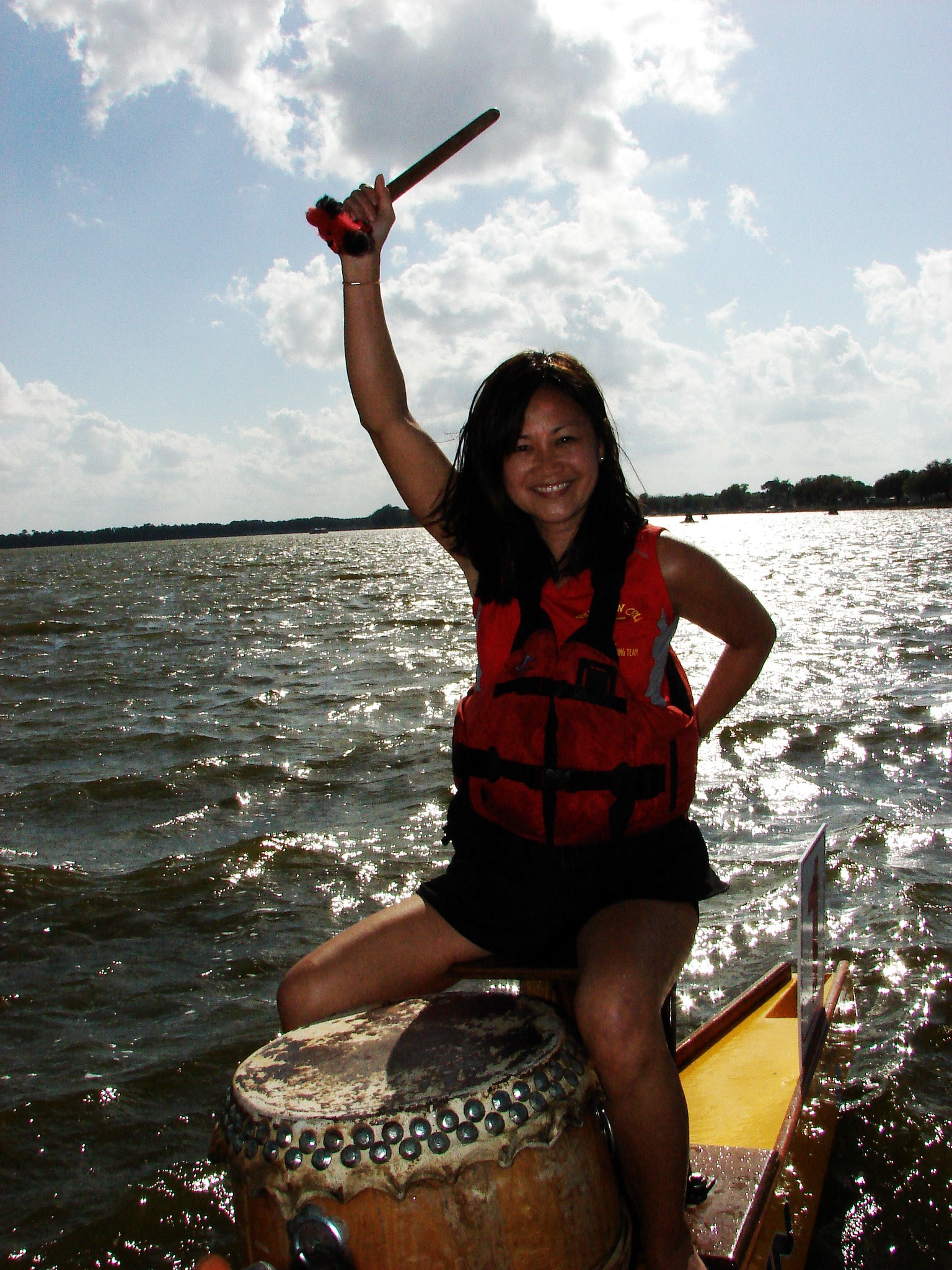Great Head and Tail | The Importance of Your Steer and Drummer
Posted by Kristin Stickels on

Team USA Premier Mixed Team wins gold! Drummer: Katie Godfrey, Steer: Billy Heffernan. Photo: Tommy Leonardi
Let’s first consider the drummer. This is a position with very traditional roots in the sport. Often an inexperienced team will grab the nearest lightweight person and throw them up at the front of the boat to sit in the drum seat. This is a practical solution, as the position is considered “dead weight.” However, this position is anything but dead.
A good drummer is worth his or her (light)weight in gold. Why is this tiny person so crucial? Your drummer sets the tone for the entire boat. Common perception is that you want your drummer to pump people up and get them motivated, but what you really need is someone to calm the team down and maintain the team’s focus. There is no lack of excitement on race day, especially with a competitive crew. At the start line, the drummer keeps the team focused during what can often be a chaotic moment of lining up multiple boats.
Once the race is underway, the drummer needs to be flexible in terms of modifying the race plan; to recover from a poor start or take advantage of a good one. Along the course, the drummer’s demeanor can keep the boat in control, calmly emphasizing what the team is doing right and giving important technique reminders (i.e. leg drive, lengthen, etc.). The drummer must be confident. The team needs to feel that the drummer knows what he or she is doing. A good drummer is confident enough to play the team’s own strategy. What does this mean? He or she won’t call for powers simply because the boat next to them does. He or she will know the team and know when to ask for more. He or she needs to understand the capacity of the team and should be able to feel the boat; know when it is sagging and needs more power, or sense when it has locked into a powerful, sustainable rate that is edging out the competition stroke-by-stroke. The drummer is the one that the team can count on to watch the action and relay the position on the race course to the team. This allows the paddlers to focus on their job and not be looking out of the boat to see where they are in the race. The drummer also needs to be prepared to hang on for dear life in some situations, uncomfortably grabbing the drum between his or her knees, while the boat handles choppy water, turns, and even the occasional crash. Overall, the drummer is someone who can remain calm under extreme pressure and should be able to provide both positive and negative feedback after the race.
And now, let’s look at the steer, also called the steersman, helmsman or sweep. As a newer paddler, one could possibly forget that there is even someone standing at the back of the boat. After all, the paddlers are facing forward and we typically have no reason to look back. In fact, many teams don’t even think about the value of a good steersman. Until something goes wrong. Steers don’t often get praise, but they certainly get a lot of blame if anything bad happens. If the boat goes straight down the lane and the team wins, they might forget to thank the steer. If the boat veers out of the lane, crashes or flips, everyone is quick to make comments about the steer.
A quality steer knows how to read the water, understands currents and pays attention to the wind. A steer recognizes how all of these things affect the boat. They can help balance the boat when the weight distribution is not equal left to right, often either riding the gunwale or contorting themselves into uncomfortable positions in order to make it easier for you to paddle. They can maneuver the boat easily without tiring their crew out by back-paddling, drawing or prying. When lining up the boat at the start line, they can interpret the start-line judge’s calls and know how to bring the boat up to the line just right, keeping their paddlers from doing much in the way of boat movements. Solid steers know how to turn a dragon boat nearly on a dime and can make or break any race with turns such as the 2k, which not only involves crucial turns, but also is loaded with strategy. And, of course, they are ultimately responsible for the safety of the boat.
Depending on the team, the calls for the boat may be made either from the drummer or from the steer. So lastly, let’s examine the importance of the calls. A drummer’s or steer’s voice carries weight. An anxious or agitated drummer or steer conveys that tone to the team and affects the entire tone to the boat. As their voice becomes shrill or piercing, the team becomes tense and begins spinning their wheels. A calm, even-toned voice can convey as much or more information and will keep the boat focused on what it needs to do, rather than distracting it with anxiety.
In addition, from either end of the boat, positive messages are more motivating than negative ones. No one wants to hear, “You suck, you’re losing!” I’m not saying that teams should ever be artificially pumped up and thinking they are wonderful when they are not giving it his or her all, but finding a positive attribute to point out along the race course while asking the team to give more will motivate a team much more than simply spewing off negativity.
So there you have it. Your drummer and steer are incredibly important to the boat. Always remember to thank them for the wonderful job they do.
Contributing authors: Trish Kosar, Pat Merrithew, Marc Applewhite, and Grace Genetia
Like what you’re reading? Get the best of paddlechica’s blog posts by following my blog! www.paddlechica.com
About the blogger
Kristin Stickels is a three-time Team USA member of the US National Dragon Boat Racing Team. She is the coach of the Miami team Puff, the Florida Tarpons women's team and the local Breast Cancer Survivors' Team (SOS).
She is also an avid outrigger canoe paddler and raced through the Panama Canal on a native cayuco boat from the Atlantic to the Pacific.
Found out more about Hornet paddles at www.hornetwatersports.com
0 comments




